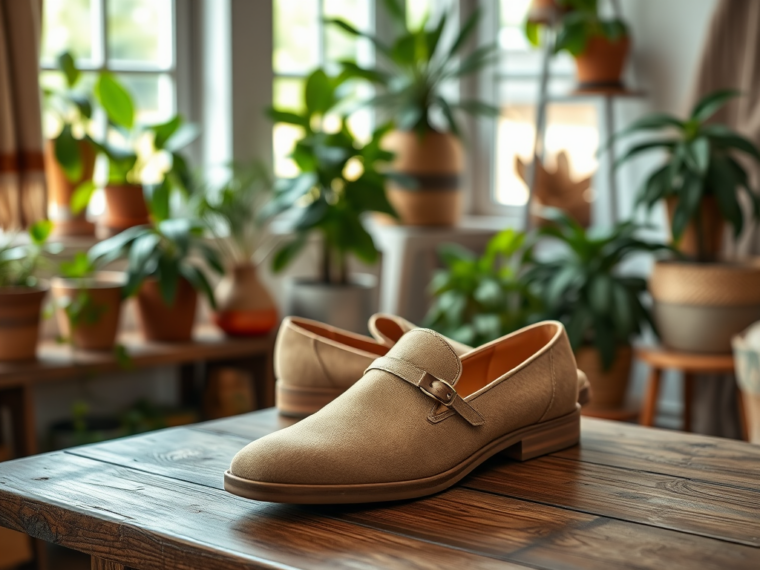As the world becomes increasingly aware of the implications of fast fashion, consumers are seeking alternatives that align with their values. Ethically sourced shoes are at the forefront of this movement, offering a way to step into a new era of conscious consumerism. These shoes not only provide comfort and style but also stand as symbols of ethical responsibility toward people and the planet. Understanding how to integrate ethically sourced footwear into your life can feel overwhelming, yet it offers the promise of a more sustainable future. This guide aims to illuminate the pathways toward making informed choices about the shoes we wear. Discover how your choice in footwear can foster positive change in the world around you.
Understanding Ethically Sourced Shoes

Ethically sourced shoes are much more than a trend; they represent a genuine commitment to social and environmental responsibility. With the rise of consumer awareness about labor injustices and climate change, more people are seeking products that embody ethical production. But what does “ethically sourced” truly mean? For footwear, it encompasses a range of considerations – from the materials used to the labor conditions of the workers involved in the production process. Consumers are urged to look deeper than brand marketing to understand the actual impact of their purchases. Let’s dive into the fundamental tenets of ethically sourced shoes.
What Defines Ethically Sourced Shoes?

The essence of ethically sourced shoes lies in their core characteristics. Firstly, sustainable materials form the backbone of conscientious footwear. These include organic cotton, recycled rubber, and plant-based leathers, significantly lowering the ecological footprint of each pair. Secondly, fair labor practices ensure workers are compensated fairly, work in safe conditions, and have their rights respected. The ethical narrative extends into the production processes, which should ideally be eco-friendly to minimize environmental degradation. Brands that embrace these principles contribute to a marketplace that values justice over profit. Let’s break down the key attributes further:
Sustainable Materials
- Organic cotton
- Recycled plastics
- Natural rubber
- Vegan leathers
- Hemp and linen
Fair Labor Practices
- Guaranteed fair wages
- Safe working environments
- Reasonable working hours
- Employee rights protections
Eco-Friendly Production Processes
- Low-water-dye techniques
- Use of renewable energy sources
- Waste reduction strategies
- Carbon offset initiatives
How to Identify Ethically Sourced Shoe Brands
With an overwhelming number of brands labeling themselves as ethical, it can be challenging to discern which ones genuinely adhere to this philosophy. Start by seeking out brands with reputable certifications that validate their processes. Look for labels such as Fair Trade, GOTS (Global Organic Textile Standard), and others, which signal a commitment to high ethical standards. Additionally, many ethical brands will offer transparency reports that outline their supply chain, production practices, and sustainability efforts. These resources are invaluable in making informed purchasing decisions. When in doubt, investigate consumer reviews online as well.
| Brand | Ethical Certification | Commitment Area |
|---|---|---|
| Allbirds | B Corp Certified | Sustainable Materials |
| TOMS | Verified Fair Trade | Social Impact |
| Native Shoes | Bluesign Certified | Eco-Friendly Production |
The Benefits of Choosing Ethically Sourced Shoes
Opting for ethically sourced footwear extends far beyond personal style. One of the most significant advantages is the support provided to local economies and communities. Many brands invest back into the regions where they operate, creating jobs and promoting artisan craftsmanship. Additionally, consumers play a pivotal role in reducing environmental impact by selecting sustainable materials and eco-friendly processes that minimize pollution. Supporting these brands sends a powerful message about consumer expectations regarding corporate responsibility. Ultimately, investing in ethically sourced shoes not only enhances your wardrobe but contributes to a healthier planet.
Tips for Incorporating Ethically Sourced Shoes Into Your Wardrobe
Transitioning to a collection of ethically sourced shoes doesn’t have to be daunting. Here are some practical tips to ease the process: Start small by replacing a couple of pairs in your wardrobe; look for versatile styles that can be worn for various occasions. Consider researching brands that align with your values and commitment to sustainability. Reading reviews and exploring their materials and production processes will empower educated choices. Keeping an open mind about second-hand and thrifted options can also lead you to ethical finds while supporting circular fashion. Finally, engage with communities and forums that focus on ethical fashion to stay updated on the best practices and brands.
Conclusion
Ethically sourced shoes represent an important facet of conscious consumerism, allowing individuals to make choices that reflect their values. By discerning what constitutes ethical practices, identifying reputable brands, and understanding the benefits of sustainable footwear, consumers are well-equipped to contribute positively to society and the environment. Each purchase is a vote for the kind of world we wish to inhabit, making us active participants in a movement that champions responsibility and compassion. Take this opportunity to step into a more ethical lifestyle, one stylish shoe at a time.
Frequently Asked Questions
- What does “ethically sourced” mean? Ethically sourced means that products are made with consideration for environmental sustainability and social justice, including fair labor practices.
- Why should I choose ethically sourced shoes? Choosing ethically sourced shoes supports sustainable practices, fair wages, and safe working conditions, helping to reduce the negative impacts of consumerism.
- How can I tell if a brand is truly ethical? Look for certifications, transparency reports, and reviews; reputable brands will often share their processes and commitments openly.
- Are ethically sourced shoes more expensive? While ethically sourced shoes can be pricier due to sustainable practices, they are often of higher quality and may save you money over time.
- Where can I buy ethically sourced shoes? Ethically sourced shoes can be found through various online retailers, brand websites, and specialized stores dedicated to sustainable fashion.





